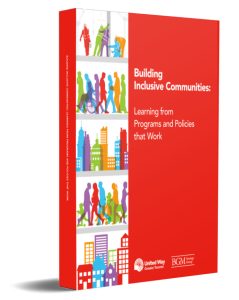- “Building Inclusive Communities: Learning from Programs and Policies that Work” released as population and immigration targets increase and More Homes Built Faster Act signals changes ahead
- Nine program and policy interventions provide roadmap for driving inclusive change at the neighbourhood level
January 11, 2023 (Toronto, ON) – With ambitious immigration targets and population projections increasing pressure on housing, transportation and social supports, and the More Homes Built Faster Act signaling a period of intensified development across Peel, Toronto and York Region, United Way Greater Toronto’s latest research, “Building Inclusive Communities: Learning from Programs and Policies that Work,” spotlights nine interventions that work to drive more affordable housing, employment opportunities and community benefits.
“United Way Greater Toronto is on the ground, in neighbourhoods across the region, listening to the needs of the communities we call home. For our collective future, we need to ensure that neighbourhood redevelopment projects are addressing the unique needs of the people who live there,” says Daniele Zanotti, CEO of United Way Greater Toronto. “When it comes to options to drive more affordable housing, employment opportunities and community benefits, our latest research report is the roadmap that our region needs right now to move forward with community.”
Whether through the Tower Neighbourhood Renewal Initiative, Social Impact Investing in Regent Park or the Inclusive Local Economic Opportunity Initiative in the Greater Golden Mile, United Way has been working with residents and partners to build inclusive communities for decades — identifying community needs, developing action plans and investing in local interventions so residents can benefit from neighbourhood transformation.
The research report compiles nine interconnecting interventions to provide a valuable resource for government, residents and resident groups, builders and developers, institutions and businesses, community-based non-profits and housing providers, and more.
Program Interventions
- Workforce Agreements – workforce and hiring policies that provide employment opportunities to local residents – like the workforce agreement included in the Regent Park Community Benefits Agreement.
- Neighbourhood-level Workforce Development Programs – programs that provide training and wrap-around supports for workforce development matched to a local employment need – like Aecon-Golden Mile Joint Venture from the Inclusive Local Economic Opportunity (ILEO) Initiative, convened by United Way Greater Toronto and BMO Financial Group
- Community Land Trusts – non-profits that purchase and hold land for affordable home ownership, rental and cooperative housing – like Parkdale Neighbourhood Land Trust.
Policy Interventions
- Rent Control – limits the rent property owners can charge, often in the form of rent increase caps as a tool to prevent displacement – like the Ontario Residential Tenancy Act 2006, 2019, 2020
- Inclusionary Zoning – a provincially mandated planning tool that enables municipalities to require or incentivize developers to provide a specific percentage of affordable housing in new developments – like the City of Toronto’s proposed Inclusionary Zoning policy (5-10% affordable in 2022 and 8-22% by 2030) that could be impacted by the More Homes Build Faster Act
- Linkage Fees – charges to developers to offset the impact new development has on government services and are directed to housing, transit, daycare and other infrastructure in neighbourhoods where they are needed most (though not necessarily the same neighbourhood as the development)
- Social Procurement – combats the impact of systemic discrimination on equity-deserving groups by incorporating equity into procurement processes – from workplace and supplier diversity to wrap-around supports – for municipal projects – like the York University Social Procurement Policy.
- Rental Unit Replacement – a municipal requirement that preserves affordable rental housing stock by requiring rental housing be maintained or replaced one-for-one at similar rents in the event of renovation, conversion or demolition. It is also known as No Net Loss – like the Toronto Rental Replacement Policy.
- Right to Return Policy – the opportunity for residents to return to their neighbourhood or building after temporary relocation due to redevelopment or renovation – like Mississauga’s Rental Housing Protection bylaw, 2019
Key Takeaways
“Building Inclusive Communities: Learning from Programs and Policies that Work” also provides key takeaways on ensuring successful outcomes, including:
- No single intervention is able or designed to address all the ways neighbourhood change affects a community; these programs and policies work best in combination.
- A shared vision for community change can guide investment and inform decisions and advocacy around proposed interventions.
- Trusted local partners play a pivotal role in convening and supporting dialogue and building relationships across diverse stakeholders.
- Neighbourhood change is a complex process and the potential for interventions to influence impact decreases as the change cycle advances.
- Being clear on intended outcomes is critical to evaluating and learning from implementation of interventions.
- Monitoring and enforcement of interventions is critical to effective implementation.

Building Inclusive Communities: Learning from Programs and Policies that Work
Media Contact:
Lindsay Kwan
Manager, Communications – United Way Greater Toronto
lkwan@uwgt.org
416-732-9700
About United Way: As the largest non-government funder of community services in the GTA, United Way Greater Toronto reinforces a crucial community safety net to support people living in poverty. United Way’s network of agencies and initiatives in neighbourhoods across Peel, Toronto and York Region works to ensure that everyone has access to the programs and services they need to thrive. Mobilizing community support, United Way’s work is rooted in ground-breaking research, strategic leadership, local advocacy and cross-sectoral partnerships committed to building a more equitable region and lasting solutions to the GTA’s greatest challenges.